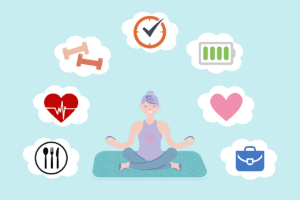
As we finish up the month of April, we encourage you to reflect on this month’s theme- the benefits of physical exercise and movement on mental health.
With all of the distractions that come with digital devices and busy schedules, it is easy to forget how important it is to keep our bodies in good health and the influence this has on mental health.
It turns out that one of the best strategies to protect and improve your mental health is to take good care of your body.
Let’s explore some of the main ways that being physically well affects our mental well-being:
Reduced Stress:
It’s well established that engaging in physical activity helps people relax. Exercise causes your brain to release endorphins, which are natural mood enhancers. These “feel-good” substances provide you a feeling of calm and relaxation by reducing tension and anxiety.
Improved mood:
Exercise plays a vital role in regulating your mood. Whether it’s a brisk walk, a jog, or a workout at the gym, physical activity can boost your mood.
Improved Self-Esteem:
Maintaining your physical well-being can greatly increase your sense of confidence and self-worth. Your self-image gets better as you reach your fitness goals which increases your sense of worth. Your mental health is much improved as a result, and you begin to feel more capable and optimistic about your life.
Cognitive Benefits:
Physical health isn’t just about the body; it’s also about the mind. Regular exercise has been linked to improved cognitive functions, including memory, concentration, and problem-solving abilities. This can help you better manage the mental challenges you encounter in your daily life, contributing to reduced stress and enhanced mental clarity.
Improved Sleep Quality:
Getting enough sleep is essential for maintaining mental health, and engaging in physical activity will help you sleep better. Frequent exercise helps control your circadian cycles, which improves sleep induction and duration. A restful night’s sleep is necessary for mental and emotional health.
Social Connection:
Many physical activities, such as team sports or group fitness classes, provide opportunities for social interaction. Social connections are known to be crucial for mental health. Engaging in these activities can help you build a supportive network of friends and increase your sense of belonging, which can provide emotional support during challenging times.
Incorporating Physical Activity into Your Life:
Now that we’ve highlighted some of the benefits of physical health on mental well-being, you may be wondering how to integrate more physical activity into your life. Here are some tips to help you get started:
Find an Activity You Enjoy:
The key to making exercise a consistent part of your life is finding an activity you enjoy. It could be dancing, hiking, swimming, yoga, or even gardening. When you love what you do, it doesn’t feel like a chore.
Set Realistic Goals:
Start with achievable goals and gradually increase the intensity and duration of your physical activities. This approach will prevent burnout and help you build a sustainable routine.
Make It a Habit:
Consistency is key. Schedule your physical activities like you would any other appointment or commitment, and stick to your plan as closely as possible
Listen to Your Body:
It’s essential to pay attention to your body’s signals. Don’t push yourself too hard, and rest when needed. Overexertion can lead to burnout or injury.
In conclusion, the connection between physical health and mental well-being is undeniable. Prioritising your physical health can have a transformative impact on your mental health, leading to reduced stress, improved mood, enhanced self-esteem, and better cognitive functioning.
